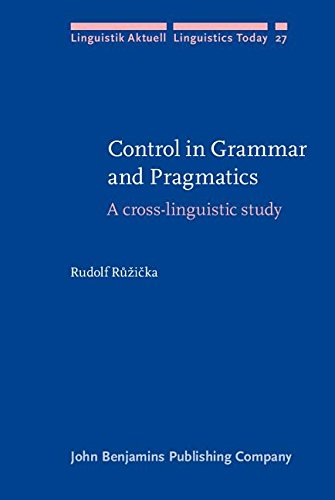Verwandte Artikel zu Control in Grammar and Pragmatics: A cross-linguistic...
Control in Grammar and Pragmatics: A cross-linguistic study (Linguistik Aktuell/Linguistics Today) - Hardcover

Inhaltsangabe
The claim that “…pronominals have phonological features only where they must, for some reason”, is strongly supported by the occurrence of the null pronoun PRO as coined and introduced by Noam Chomsky. How reference of PRO is determined is the main subject of control theory, the subsystem of core grammar to which this study is dedicated. Chomsky has not followed up his “natural suggestion that choice of controller is determined by theta roles or other semantic properties of the verb, perhaps pragmatic conditions of some sort.”
But then, a great many students of control have engaged in exploring thematic roles as tools most suitable for investigating control.
Shifting analysis of control to the relationship between thematic features carried by PRO and its potential controller respectively, was a turning point in control theory. Control proved to be a by-product of satisfying matching conditions that exist between thematic properties of PRO and its licit controller. The constraints derived from them are not construction-specific.
If grammar and pragmatics seem to go hand in hand, their complicity in determining control behavior is elucidated by showing that pragmatic factors can be referred to by grammatical constraints. Data of nine languages are used in the study.
Die Inhaltsangabe kann sich auf eine andere Ausgabe dieses Titels beziehen.
Reseña del editor
The claim that “ pronominals have phonological features only where they must, for some reason”, is strongly supported by the occurrence of the null pronoun PRO as coined and introduced by Noam Chomsky. How reference of PRO is determined is the main subject of control theory, the subsystem of core grammar to which this study is dedicated. Chomsky has not followed up his “natural suggestion that choice of controller is determined by theta roles or other semantic properties of the verb, perhaps pragmatic conditions of some sort.”
But then, a great many students of control have engaged in exploring thematic roles as tools most suitable for investigating control.
Shifting analysis of control to the relationship between thematic features carried by PRO and its potential controller respectively, was a turning point in control theory. Control proved to be a by-product of satisfying matching conditions that exist between thematic properties of PRO and its licit controller. The constraints derived from them are not construction-specific.
If grammar and pragmatics seem to go hand in hand, their complicity in determining control behavior is elucidated by showing that pragmatic factors can be referred to by grammatical constraints. Data of nine languages are used in the study.
„Über diesen Titel“ kann sich auf eine andere Ausgabe dieses Titels beziehen.
EUR 12,44 für den Versand von USA nach Deutschland
Versandziele, Kosten & DauerSuchergebnisse für Control in Grammar and Pragmatics: A cross-linguistic...
Control in Grammar and Pragmatics: A cross-linguistic study (Linguistik Aktuell/Linguistics Today)
Anbieter: Books From California, Simi Valley, CA, USA
Hardcover. Zustand: Good. Some rubbing to boards, otherwise VG. Pages/boards clean. Artikel-Nr. mon0003297014
Anzahl: 1 verfügbar
Control in Grammar and Pragmatics: A cross-linguistic study (Linguistik Aktuell/Linguistics Today)
Anbieter: Books From California, Simi Valley, CA, USA
Hardcover. Zustand: Fine. Brand New! Sealed in publisher's shrinkwrap. Never opened! No signs of wear. Artikel-Nr. mon0003097866
Anzahl: 1 verfügbar

